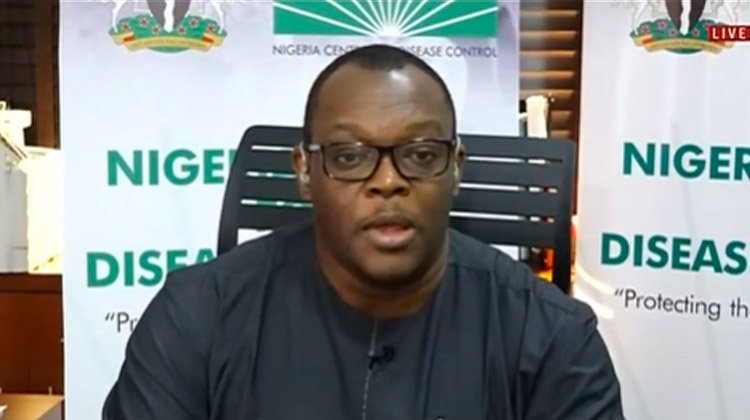
The data also revealed that there was a 390.4 per cent increase in testing, which has led to an increase in the report of positive cases.
The report, which was released by the Nigeria Centre for Disease Control, noted that “in weeks 23 and 24, the number of samples tested increased to 75,277 from 15,347 reported in weeks 21 and 22. These were reported in the 36 states and FCT.”
According to the World Health Organisation, from January 3, 2020 to July 5, 2022, there have been 257,637 confirmed cases of COVID-19 with 3,144 deaths in Nigeria.
The global health organisation also said a total of 50,619,238 vaccine doses had been administered in the country as of June 26, 2022.
But the NCDC report, obtained on Monday, said, “In weeks 23 and 24, the number of confirmed cases in absolute numbers increased to 445 from 267 in weeks 21 and 22(May 23 to June 5).
“In weeks 23 and 24, discharged cases increased to 185 from 47 in weeks 21 and 22.”
According to the NCDC data, Delta State reported 14 cases; FCT reported 24 cases; Kaduna 7; Kano 22; Lagos 314; Nasarawa 11; Plateau 1 and Rivers 44 cases in weeks 23 and 24, making a total of 445 cases.
Cross River State reported one case; FCT 20; Imo 38; Kaduna 3; Kano 42; Kwara 5; Lagos 137; Nasarawa 3; Rivers 16, making a total of 267 cases in weeks 21 and 22.
The PUNCH reports that there has been an increase in the number of reported cases in the United Kingdom.
According to the United Kingdom’s Office for National Statistics, COVID-19 infections in the UK are up by 32 per cent in the previous week with an estimated 2.3 million people infected.
The ONS said infection rates had continued to increase across all the four UK countries, likely driven by the growth of the BA.4 and BA.5 omicron sub-variants.
While the Federal Government did not explain why it increased its testing capacity, the NCDC in its report said, “There was an increase in reported cases from week 16 to week 22.”
Speaking in an interview with The PUNCH, an expert virologist from the University of Maiduguri, Prof Marycelin Baba, noted that COVID-19 never “went on leave.”
Baba said, “COVID-19 did not go on leave in Nigeria. It is a virus; you can not totally say that you have eliminated a virus like that. Well, the NCDC might have observed something which led to an increase in testing.
Experts speak
“The UK is also reporting an increase in the number of cases and maybe the NCDC decided to increase testing because of that. However, as we have always said, vaccination is the only way out. People should get vaccinated.”
Efforts to reach the NCDC Director of Communications, Yahaya Disu, on the reason for the increase in cases proved abortive as he was yet to reply to inquiries by The PUNCH as of the time of filing this report.
Meanwhile, official data from the National Primary Health Care Development Agency revealed that over 21 per cent of eligible persons in Nigeria had been fully vaccinated, with 7 million eligible persons vaccinated monthly over the past three months.
The data revealed that 13 states of the federation have failed to vaccinate at least 10 per cent of the eligible population despite the launch of mass vaccination campaigns.
The PUNCH reports that the Federal Government through the NPHCDA in November 2021 launched mass vaccination campaigns as a strategy to increase the rate of COVID-19 vaccine intake in the country.
According to the NPHCDA data obtained by The PUNCH on Tuesday, 13 states had yet to achieve 10 per cent vaccine coverage, thereby slowing down Nigeria’s plan of achieving 40 per cent herd immunity.
The NPHCDA listed the states and their percentages as follows: Benue 9 per cent; Bauchi 9; Anambra 8; Imo 8; Enugu 7; Rivers 7; Borno 7; Niger 7; Kogi 6; Akwa-Ibom 5; Edo 5; Ebonyi 4; and Bayelsa with two per cent.
Efforts to reach the Executive Director of the NPHCDA, Dr Faisal Shuaib, on the plans to encourage and speed up the vaccination processes in states were unsuccessful. He had yet to reply to an SMS as of press time.
Pilgrims, corp members
Meanwhile, speaking in an interview with The PUNCH, a Professor of Public Health at the University of Ilorin, Prof. Tanimola Akande, noted that the surge in cases might be due to the tests conducted on the pilgrims and corps members.
He said, “COVID-19 has not gone. We are testing more because of the pilgrims and corps members; that may be responsible for the rise. The virus is still spreading but the virus doesn’t bring people down.
“That means because people are taking the vaccine, it has reduced the effect. There is no way COVID-19 will disappear totally, we are going to be having occasional spikes but they will not be as virulent as when there was no vaccine.”
Similarly, another health expert at the Adekunle Ajasin University, Prof Victor Olumekun said, “There are two reasons responsible for the rise. The first is that people are getting more careless. Nigerians are no longer following the procedures for preventing the spread of the virus. You hardly go out and see people wearing face masks.
“Also, because it is a viral virus, a mutation happens: that is why you see that we have virulent variants coming up. The virus has not gone anywhere, the only thing is that it is not as deadly as it used to be because we are approaching herd immunity.
“That means the virulence will reduce and the infectivity; that does not mean it has gone. People who are yet to get vaccinated should go and do so.”
Experts who spoke with The PUNCH attribute the surge in the country to low cases of vaccination and neglect of the non-pharmaceutical measures by Nigerians.
A Professor of Community Medicine and Public Health and Vice-Chancellor of the University of Medical Sciences, Ondo, Adesegun Fatusi harped on mass vaccination and adherence to non-pharmaceutical measures.
“COVID-19 has not gone, it is still very much around but unfortunately, everybody has thrown off caution. People are no longer cautious and only a few people have taken the COVID-19 vaccine. So, we won’t be surprised that there’s a resurgence because there is an increase in cases in Nigeria and other countries.
“We must ensure that everybody is vaccinated and let’s be cautious that COVID-19 is around. We must go back to what we’ve always been doing including non-pharmaceutical measures,” he advocated.
Also, a Medical Virologist and Immunologist at the Adeleke University, Ede, Osun State, Dr. Oladipo Kolawole said the only way to combat the surge is by increasing the vaccination rate.
He noted, “The rate at which people are taking vaccines has reduced; some took their first dose without taking the second dose. COVID-19 vaccination is now only compulsory for those that are travelling out because they know that it is required at the airport.
“For those that are not travelling out, they are not finding the vaccination necessary. The truth is some other countries are also experiencing a surge.”
“We need to go back to the status quo and encourage people to take the COVID-19 vaccines and take necessary precautions. Then, the government needs to buy more vaccines for the community, and not wait for donations,” Kolawole said.
According to the President of the Nigerian Biological Safety Association, Prof. Abiodun Denloye, the relaxation of the various measures was responsible for the surge in the virus.
He called for heightened public awareness and adherence to precautionary measures.
“We have loosened up in terms of precautions such as the wearing of masks in public places, hand washing and so, it’s not surprising that we have a resurgence. We need to continue to create awareness because across the globe. COVID-19 has not gone completely and we have to go back to what we used to do,” the don said.
Corroborating this, the Chairman, Lagos State chapter of the National Association of Nigerian Nurses and Midwives, Olurotimi Awojide said there is a need to reinforce the COVID-19 precautionary measures to reduce the surge.
He lamented that Nigerians had abandoned the wearing of face masks, noting that some health protocols may need to be imposed to rein in the infections.
Reacting to the increasing cases of COVID-19, the Publicity Secretary, National Association of Resident Doctors, Dr. Alfa Yusuf, said “People have stopped observing the precautionary measures. People have stopped using face masks. People have stopped observing personal protective procedures. In fact, a lot of people are not vaccinated.”





